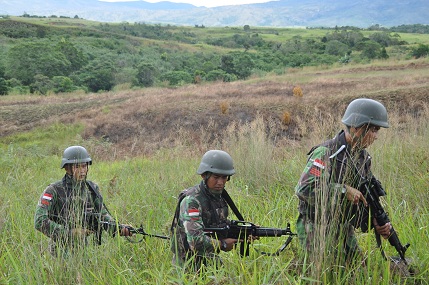In 2007, this young man in Poso was only 17 years old. Let’s say his name is Andika. He really admired Basri alias Bagong, one of the leaders of the East Indonesia Mujahideen. Basri himself is currently serving his sentence at the Nusakambangan Penitentiary.
Andika marveled at the figure of Basri, who in 2007 was only 32 years old. His long hair, and it is said that his bravery made the young man admire Basri. So he became a ‘follower’. Under Andika was an army of children who became the eyes and ears of the Mujahideen group in Tegalrejo, Kayamanya and Bonesompe. Call them ‘ducklings’. No one can explain why his name is like that. It could be because they really ‘duck’ on the senior mujahiddin.
In 2001 – 2007, the mujahiddin groups in the three areas within Poso City were indeed well-known. They respect Ustadz Muhammad Adnan Arsal. The Ustadz, who is a former Head of the Poso Religious Affairs Department, admitted that he knew the mujahideen suspects personally.
“Because I educate them religious knowledge. But I don’t teach them about violence and so on,” said Ustadz Adnan on several occasions when he met me.
Even after the events of 11 and 22 January 2007, it was said that he kept in touch with the mujahideen, even though at that time no less than 29 ‘foster children’ had been labeled with new identities; terrorist.
Ustadz Adnan was adamant that they needed to be nurtured and given understanding, because their resistance was based on the government’s injustice in resolving the abandoned Poso case. However, his voice was ignored. Operation by the joint task force, Police and Army were launched to hunt them down. Some were shot dead, some were captured alive. Then, the circle of revenge continues to grow.
Later, after his ‘foster children’ formed the East Indonesia Mujahiddin Group and guerrillas, Ustadz Adnan chose the ‘middle way’. He asked them to surrender well rather than carry out acts of terror. Unfortunately, his request was ignored.
Then where’s the ‘duckling’? They are still there. But the title is no longer popular. Now they are called terrorist sympathizer. Some are active and some are silent. Their sympathizers are not only in Poso City or in the Central Sulawesi region but also from Java, the Philippines, Afghanistan to Syria. If within the Poso area it is limited to providing information and couriers, sympathizers from outside the region supply money, weapons and bomb materials.
The Head of the Central Sulawesi Regional Police, Inspector General of Police Rudy Sufahriadi is one of the police officers who understand this very well. When the ‘duckling’ grew, he became the Chief of the Poso Resort Police with the rank of Adjunct Senior Commissioner of Police. Then he became the Chief of the Central Sulawesi Police with the rank of Brigadier General of Police.
Rudy was present in a number of actions that the police named as operations to restore security and order and law enforcement in Poso. Starting from Operation Sintuwu Maroso, Camar Maleo, Tinombala to Madago Raya, this high-ranking officer who was born in Cimahi, August 23, 1965 was actively involved. He understands the series after series of social riots in Poso, the birth of ‘ducklings’ to the proliferation of terrorism in the region.
The matter of ‘ducklings’ which has now turned into sympathizers, whether active or silent, is indeed a problem in itself.
TNI Brigadier General Farid Makruf, MA, former Commander of Korem 132/Tadulako when in a duet with Inspector General of Police, Retired Abdul Rakhman Baso leading the Madago Raya Operation, always reminded it.
“That is indeed a problem. If you want this operation to be over, stop being their sympathizer. Stop providing information and other logistical support to them, they will surely be overwhelmed and cornered,” said the Kopassus officer who is now the Director of Education and Training of the Army Territorial Center.
As for Rudy, he did have a ‘good hand’ in operation after operation. When he became the Central Sulawesi Police Chief in 2016, Santoso alias Abu Wardah was shot. Santoso was shot on July 18, 2016. When he returned in 2021, Ali Kalora and Qatar were ‘done’. Of the more than 40 MIT fighters wanted by the police, including six foreigners from Uighurs, the People’s Republic of China, now only three remain. On Tuesday, January 4, 2022, the Sogili Team 3 Special Detachment 88 ended the escape of Ahmad Gazali alias Ahmad Panjang. Practically MIT does not have any more strength in terms of personnel and weapons.
MIT ‘Has Fallen’. This borrows the title of the action film Olympus Has Fallen which describes when the White House fell under the control of North Korean terrorists, then they took the American President hostage. However, is this issue of terrorism over? Not necessarily. The cycle of revenge created from operation to operation continues to grow. It could be getting bigger.
One time, I visited the house of the late Suwarni, the wife of Santoso alias Abu Wardah still waiting her husband’s body will soon be brought from Palu to Landangan, Poso for burial. The welcome was friendly as usual. But from inside suddenly a loud voice chased us away. It was the voice of Wardah, Santoso’s daughter. Later he married Khairul alias Irul alias Aslam, an MIT member who was shot dead on March 1, 2021 in Tambarana, Poso Pesisir.
That’s how the circle of revenge is maintained. It can be endless. Wardah considered us to be part of the Thagut, a god other than Allah, the god that Muslims believe in. That’s why he wouldn’t let us step on his house. This is just one example of the many friends, children, wives and other inner families. If you don’t pay attention, it’s not impossible that the ‘duckling’ in other versions will grow.
There are strategies to be reconsidered after this law enforcement operation is completed. It shouldn’t just stop when the operation is done. Terrorism, conflict between individuals, between groups and communal as old as civilization. It lives throughout the ages of the earth.
Territorial development such as that carried out by the Indonesian National Armed Forces, and the activity of Polmas or community policing, which was once popular in the Police, must be the answer. It is important to prevent the understanding of radicalism which later turns into terrorism. Coupled with the support of the Regional Government. Of course the police, army and government already have a strategy. The community definitely supports it. ***




